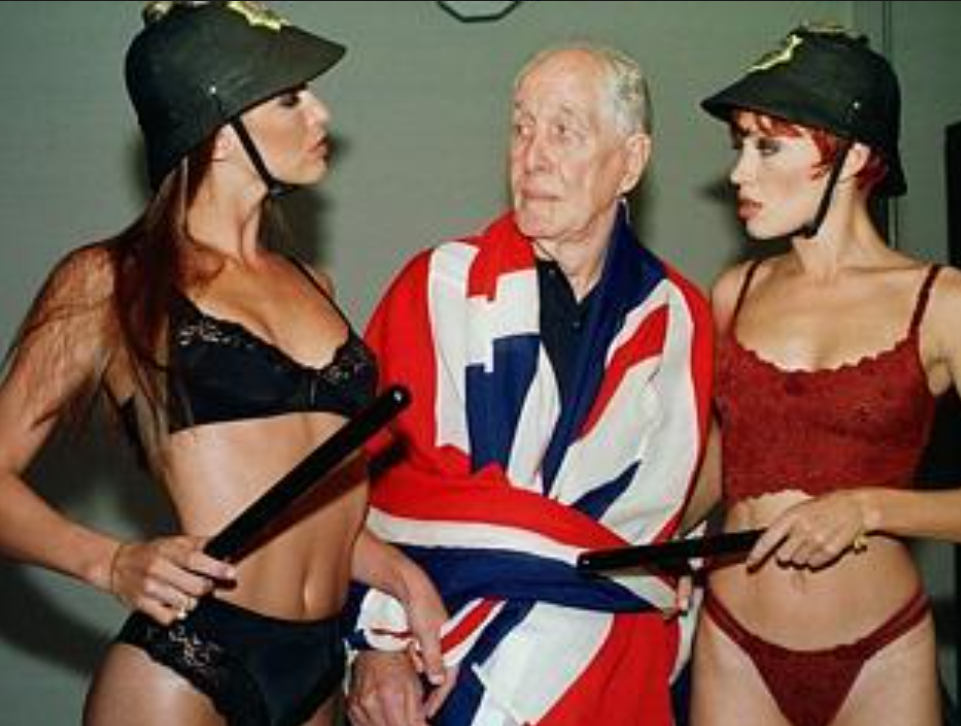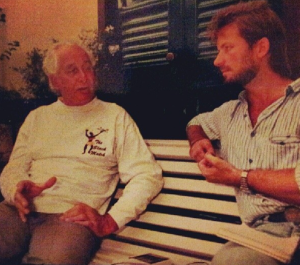
THE Great Train Robber Ronald Biggs has died at the age of 84.
He wasn’t everyone’s favourite. Certainly not Jack Slipper’s and not that of the upper crust in his adopted country of Brazil, who thought his international notoriety and runaway status reflected poorly on them.
But Great Train Robber Ronnie Biggs was a big-hearted and entertaining bloke who could throw open his gorgeous Santa Teresa house in the hills above Rio de Janeiro to visitors for months at a time. Who could hold larger-than-life court at parties, winking and grinning at waitresses, captivating friends and critics alike with quick-witted repartee, or throwing down the gauntlet of a throat-scorching wasabi-scoffing contest.
I tripped over Biggs in 1990, in Rio’s Cinelanda district where, in a loud orange and black patterned shirt and white trousers, and a kilometre-wide grin, he stood out like only a tall, greying 60-year-old English highwayman could. Like dog’s balls.
Last thing you’d expect for a bloke on the run. But then, by this stage, 27 years after the robbery Biggs was part of a 15-strong gang which relieved the Glasgow-London mail train of pound stg. 2.6 million in 1963 and what with all his fugitive tearing about, Ronnie was pretty well ensconced in the tropical paradise-cum-prison of Rio.

He was hardly running anywhere. Indeed, one of his legs was ulcerated and the hills of Santa Theresa were hard work.
Moreover, he was dirty on the fact his cruzados had just plummeted in value some 70 per cent or more, courtesy an unannounced anti-inflation/anti-corruption freeze on bank withdrawals by newly-elected then president Colhor de Melho.
Like the 12 million other Rio locals, or Cariocas, Biggs was unhappy with the government. Corruption might have been endemic but this was ridiculous. The only currency worth anything was the US greenback.
The Prisoner of Rio, as Biggs had been dubbed, was planning a party to celebrate 20 years in his Brazilian playground but was forced to call the whole thing off. For a Great Train Robber, he wasn’t especially flush. Things can be tough on the lam in Third World South America. Ron wasn’t rich and he’d been forced to call in a few favours.
The fact his son Michael had been a child TV star was the only real reason he’d been able to maintain a respectable lifestyle in Rio. Talk about landing on your feet in a foreign country but Michael was 16 and Ronnie, by then separated from Michael’s mother Raimundo de Castro, was staring down the barrel of deportation as his son approached adulthood.
So life wasn’t without its problems. Mind you, bounty-hunters had for the time being refrained from kidnap attempts on his person. That’s a long and convoluted story in which Biggs demonstrated his remarkable good luck and eternal slipperiness but, sorry, I wander from the theme.
Which is, that Ronnie Biggs’ persona was that of a celebrity on parade. Funny, irreverent, charming, polite, garrulous. Slip him a few drinks and you’d never shut him up. Nor would you want you.
I was in Rio visiting friends who’d recently been married and were catching up with Ron, who had introduced them amid the sexy lambadas and jungle-juice caiparinhas of a dark and sultry nightclub he owned a few years earlier.
We repaired to a Brazilian Japanese restaurant where Biggs demonstrated his mastery of the Portuguese language on the waitresses, plus a powerful liking for sake, sushami and tempura, in that order.
He also showed an interest in everything from politics and economics to filmmaking, music, writing, children, pets and business tropical nightclubs, cholesterol-riddled Brazilian barbecue restaurants, caiparinha-and-lemon export opportunities, film, biographies …
Biggsie wasn’t short of ideas, if not necessarily the healthiest, but hey he wasn’t a vegan, he was a train robber. A capitalist.
He was also a major-league bon vivant or whatever the Portuguese equivalent is. Women, alcohol, food, laughter and thumb your nose at authority.
He regaled us with tales of stripteases by Brazilian girlfriends. He railed at Polish filmmakers. He rabbited on about Skyhooks guitarist Bongo Starkie and a documentary he’d made. He expounded on the role of the bunda the derrière in Brazilian culture, and he talked parrots and rotweillers.
He pined proudly over his Australian sons, Chris and Farley, and their exploits. Likewise his Brazilian son Michael’s developing guitar skills. He praised French jazz violinist Stefan Grappelli, cracked jokes of the iceberg-Steinberg variety, related spectacular dune buggy and other vehicle accidents, flirted overtly with Carioca girls and denounced Australian girls as “dry as dust only (fornicate with) them if you must”.
He had troubles with neighbours with whom he shared a three-storey apartment where his raucous, albeit magnificent, macaw was disturbing the peace. He worked overtime chatting up the girl I was with and she bloody loved it. Silver-tongued bloody train robbers.
My diary tells me 10 bottles of longneck Bohemian beer and three jugs of sake contributed to the male side of conversation. For three blokes in Rio, that was pretty tame and probably the reason I managed to record anything and arrange to meet him later for a proper interview about escaping jails and the likes.
Funny thing was, when we caught up again, which we did a couple of times, it was hard to get down to the nitty gritty of business. For starters, I got lost for a couple of hours in the gringo-hating, crime-riddled favelas trying to find his Santa Teresa house and this long before the favelas tried tapping their crime tourist potential and was more than delighted to eventually see a friendly face.
My diary tells me: “Drove up to Santa Theresa, splendid views across Rio as you climb the Corcovado mountain. Found Ron’s place … beer thrust into my hand, no breakfast yet. Did interview by pool in the back yard surrounded by rottweiler, dogs, parrot … later played a kind of snooker game. Won the first but was hopelessly down on the second game only to make a strong finish to win two straight. Felt a bit rough but told him I’d be glad to thrash him again any time he liked.”
For my hubris, I was rewarded with a basilisk eye and a disturbing glance askance from one of his slight but heavily-tattooed visiting English mates. Then we all laughed. I perspired and it had nothing to do with the tropics.
I visited Ron again before I left Rio to return to Australia. He posed proudly in a Black Match T-shirt, a present from a bloke who worked at the Richmond pub of the same name.
Biggs was proud of the shirt. He’d hidden away for some time around the corner, in Richmond’s GTV9 Bendigo St studios years earlier before fleeing to Brazil.
“Right next to the king of Australian TV at the time, Graham Kennedy’s dressing room,” he laughed.
This story appeared in the Geelong Advertiser 19 December 2013.


